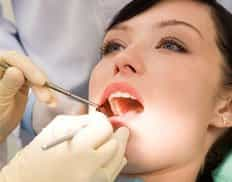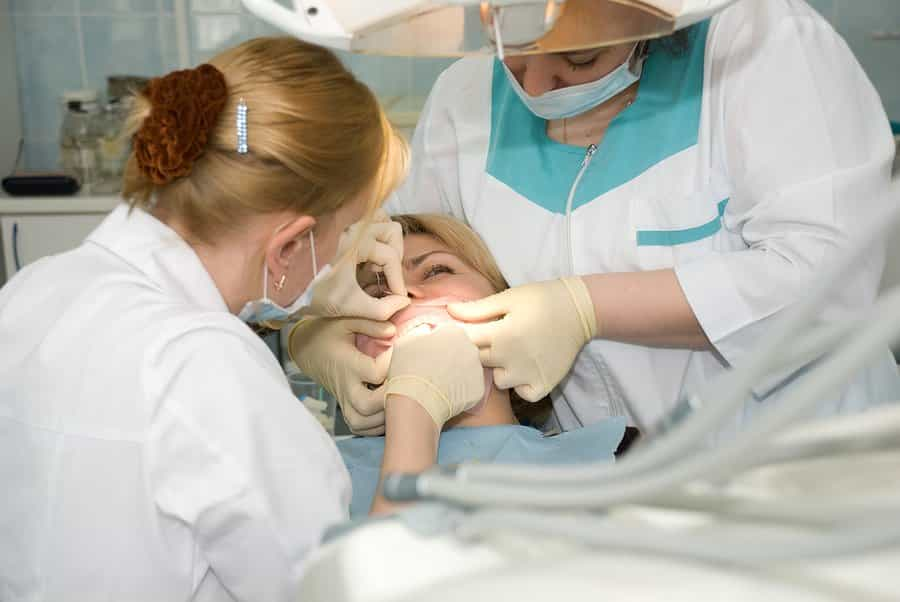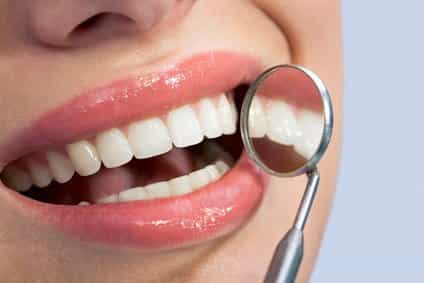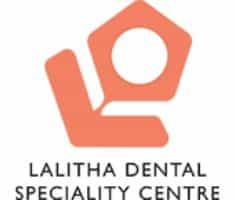
Did you know that laser periodontal surgery eliminates up to 99% of bacteria that causes gum disease? It is a non-invasive, gentle alternative to the dreaded scalpel and suture procedure. If you have gum disease that has gone from mild to severe ask our team about the laser treatment method. The best part is there is no pain because no cutting is involved. The laser has a tiny laser fiber about as thick as three strands of hair. It works by producing an invisible beam of energy. Laser use is growing very popular among dentists and patients because they are substantially less traumatic.
There are various uses of Laser in Periodontal surgeries and endodontic treatment:
1. Periodontal Flap Surgery
2. Implant therapy
3. Gingivectomy
4. Crown lengthening
5. Abscesss drainage
6. Minor surgical procedures
7. Frenectomy
8. Removal of enlarged tissue or growth
9. Sterilisation of canals during root canal treatment
10. Bleaching
You will probably be surprised to know that after the procedure you can return back to work immediately. Laser periodontal surgery is not associated with significant bleeding, swelling, infection, or post-op discomfort.The post operative healing is superior and normally no use of antibiotic is required unless major treatment is done.
Dr.Viral offers the best worldclass Laser assisted treatment in dentistry. His patients have been very happy with the outcomes and more and more International patients are willing to get the best that science has to offer currently from him.
Its time to lose your phobia for dental treatment now...
Periodontal Health & Pregnancy:
For a long time we've known that risk factors such as smoking, alcohol use, and drug use contribute to mothers having babies that are born prematurely at a low birth weight. Now evidence is mounting that suggests a new risk factor – periodontal disease. Pregnant women who have periodontal disease may be seven times more likely to have a baby that is born too early and too small. More research is needed to confirm how periodontal disease may affect pregnancy outcomes. It appears that periodontal disease triggers increased levels of biological fluids that induce labor.
Furthermore, data suggests that women whose periodontal condition worsens during pregnancy
have an even higher risk of having a premature baby. All infections are cause for concern among pregnant women because they pose a risk to the health of the baby. The Academy recommends that women considering pregnancy have a periodontal evaluation done by a periodontist on a regular basis before and after pregnancy.
- How pregnancy affects teeth and gums
- Why periodontal disease is linked to preterm low birthweight babies
- What to do about periodontal disease during pregnancy
- How to reduce the risk of premature births
- Links to more info on oral health and pregnancy
The test came back and it's positive – you're pregnant. Your mind is rattled with excitement, and you have created a “to-do.” While your “to-do” list and questions continue to grow, it's important to take the necessary steps to ensure an on-time and safe arrival of your most precious cargo yet. You've probably heard a few old wives' tales about pregnancy, including “A tooth lost for every child.” While it seems far-fetched, it actually is based loosely in fact. Your
teeth and gums are affected by pregnancy, just as other tissues in your body. You may not be aware that the health of your gums may also affect the health of your baby-to-be.
How does pregnancy affect your teeth and gums?
About half of women experience pregnancy gingivitis. This condition can be uncomfortable and cause swelling, bleeding, redness or tenderness in the gum tissue. Conversely, a more advanced oral health condition called periodontal disease (a serious gum infection that destroys attachment fibers and supporting bone that hold teeth in
the mouth) may affect the health of your baby.
Is periodontal disease linked to preterm low birthweight babies?
Studies have shown a relationship between periodontal disease and preterm, low birthweight babies. In fact,
pregnant women with periodontal disease may be seven times more likely to have a baby that's born too early and
too small. The likely culprit is a labor-inducing chemical found in oral bacteria called prostaglandin. Very high levels of prostaglandin are found in women with severe cases of periodontal disease.
What if I'm diagnosed with periodontal disease during pregnancy?
If you're diagnosed with periodontal disease, your periodontist might recommend a common surgical or a nonsurgical procedure called scaling and root planing. During this procedure, your tooth-root surfaces are cleaned to remove plaque and tartar from deep periodontal pockets and smooth the root to remove bacterial toxins.
Research suggests that scaling and root planing may reduce the risk of preterm births in pregnant women with periodontal disease. The added bonus is that the procedure should alleviate many of the uncomfortable symptoms associated with pregnancy gingivitis, such as swelling and tenderness of the gums.
As you make your way through the “to-dos,” remember to check off a visit to the dentist or periodontist. This baby step benefits you and your unborn baby.
Relationship of periodontal health and Heart diseases:
Several theories exist to explain the link between periodontal disease and heart disease. One theory is that oral
bacteria can affect the heart when they enter the blood stream, attaching to fatty plaques in the coronary arteries
(heart blood vessels) and contributing to clot formation. Coronary artery disease is characterized by a thickening
of the walls of the coronary due to the buildup of fatty proteins.
Blood clots can obstruct normal blood flow, restricting the amount of nutrients and oxygen required for the heart to function properly. This may lead to heart attacks. Another possibility is that the inflammation caused by periodontal disease increases plaque build up, which may contribute to swelling of the arteries.
Researchers have found that people with periodontal disease are almost twice as likely to suffer from coronary artery disease as those without periodontal disease. Periodontal disease can also exacerbate existing heart conditions. Patients at risk for infective endocarditis may require antibiotics prior to dental procedures. Your periodontist and cardiologist will be able to determine if your heart condition requires use of antibiotics prior to dental procedures.
Relationship of periodontal health and Diabetes:
People with diabetes are more likely to have periodontal disease than people without diabetes, probably because diabetics are more susceptible to contracting infections. In fact, periodontal disease is often considered the sixth complication of diabetes. Those people who don't have their diabetes under control are especially at risk.
A study in the November issue of the Journal of Periodontology 2007 found that poorly controlled type 2 diabetic patients are more likely to develop periodontal disease than wellcontrolled diabetics are. Research has emerged that suggests that the relationship between periodontal disease and diabetes goes both ways - periodontal disease may make it more difficult for people who have diabetes to control their blood sugar.
Severe periodontal disease can increase blood sugar, contributing to increased periods of time when the body functions with a high blood sugar. This puts diabetics at increased risk for diabetic complications. Thus, diabetics who have periodontal disease should be treated to eliminate the periodontal infection.
This recommendation is supported by a study reported in the Journal of Periodontology in 1997 involving 113 Pima Indians with both diabetes and periodontal disease. The study found that when their periodontal infections were treated, the management of their diabetes markedly improved.
Relationship of periodontal health and Respiratory diseases 
Bacterial respiratory infections are thought to be acquired through aspiration (inhaling) of fine droplets from the mouth and throat into the lungs. These droplets contain germs that can breed and multiply within the lungs to cause damage. Recent research suggests that bacteria found in the throat, as well as bacteria found in the mouth, can be drawn into the lower respiratory tract.
This can cause infections or worsen existing lung conditions. People with respiratory diseases, such as chronic obstructive pulmonary disease, typically suffer from reduced protective systems, making it difficult to eliminate bacteria from the lungs. Scientists have found that bacteria that grow in the oral cavity can be aspirated into the lung to cause respiratory diseases such as pneumonia, especially in people with periodontal disease.
This discovery leads researchers to believe that these respiratory bacteria can travel from the oral cavity into the lungs to cause infection. Chronic obstructive pulmonary diseases (COPD) cause persistent obstruction of the airways. The main cause of this disease is thought to be long-term smoking. Chemicals from smoke or air pollution irritate the airways to cause obstruction. Further damage to the tissue and working function of the lungs can be prevented, but already damaged tissue cannot be restored - untreated or undetected COPD can result in irreversible damage.
Scientists believe that through the aspiration process, bacteria cam cause frequent bouts of infection in patients with COPD. Studies are now in progress to learn to what extent oral hygiene and periodontal disease may be associated with more frequents bouts of respiratory disease in COPD patients.







.png)
.png)
.png)
.png)










